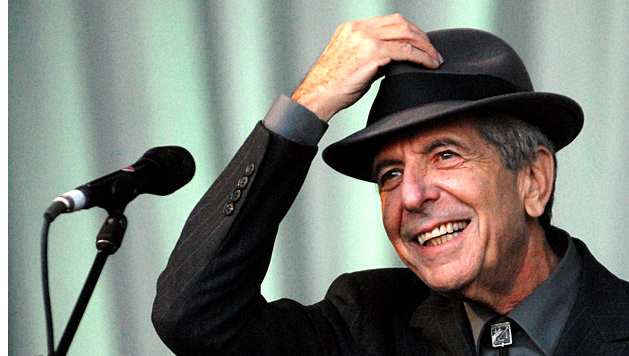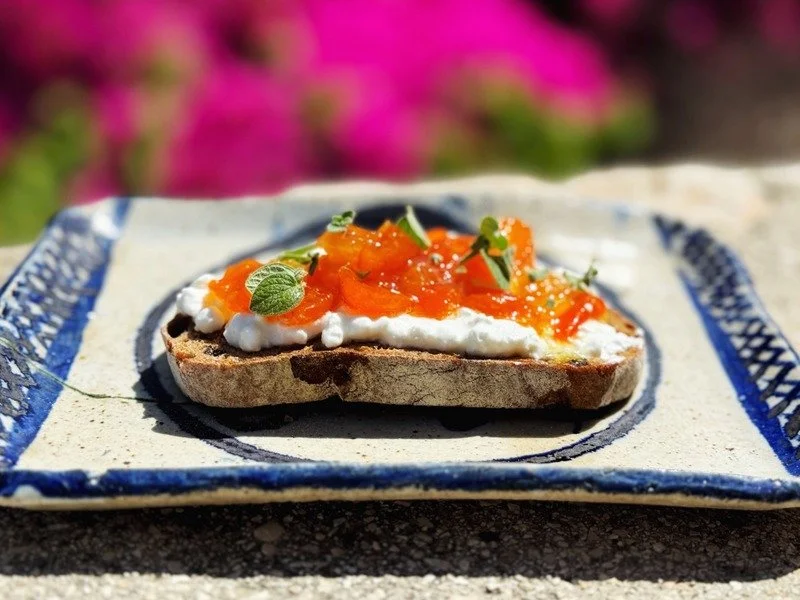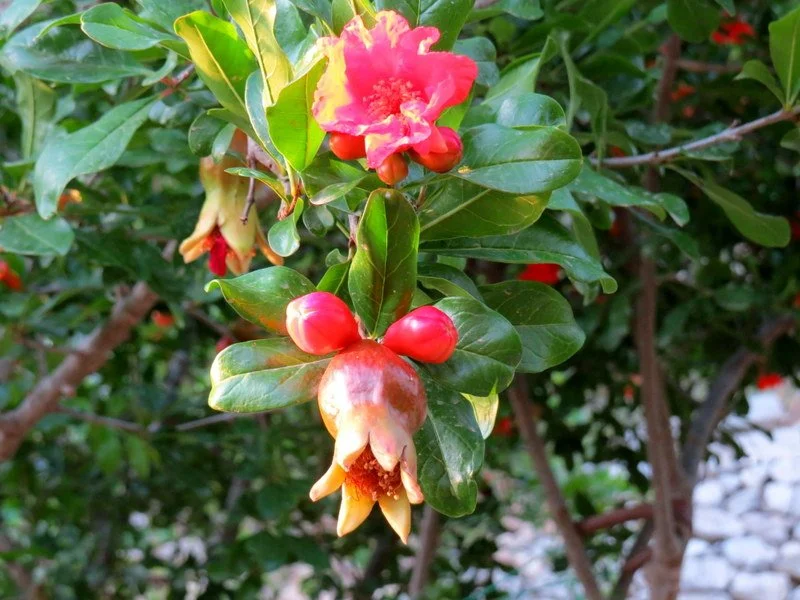IT'S A COLD AND IT'S A BROKEN HALLELUJAH
This month the world lost Leonard Cohen, poet, singer-songwriter, Buddhist monk descended from rabbis, spiritual seeker, ladies’ man and electrifying performer and creative spirit. Although he was 82, his death has come as a shock. We are all fans here at Food is Love, and we're devastated.
Leonard Cohen performing in Israel, 2009 (Photo: Marko, Flash 90) He donated the proceeds from this concert to groups working for peace between Israelis and Palestinians. At the end of the concert he blessed the audience, with the 'Birkat Hacohanim' the traditional priestly blessing.
Cohen was one of those rare artists who improves with age, becoming better in his 70s, when performing finally became second nature, than he’d been in his 20s. A number of people who saw him during that final series of live concerts he did from 2008 onwards, describe it as the most moving performance they have ever experienced. Cohen came out on stage announcing that he would give the audience all of him, and they felt he did.
Also inspiring is that he embarked on this concert tour because his manager had stolen millions from him and he wanted to have some inheritance to leave to his children. Here's how Canadian weekly magazine Macleans describes it:
“The result was beyond anyone’s expectations—a critically acclaimed show that began in concert halls, expanded to sports arenas, and generated an epic series of world tours that spanned five years. It finally wound down in 2013, as an uncharacteristically jubilant Cohen enlivened his stage patter with a promise that he would take up smoking again when he turned 80. He played places he’d never visited, and drew large audiences across the United States for the first time.
There’s no real precedent for this in pop music. Imagine: here was an artist who had gone years without a hit, and had spent much of the 1990s in seclusion in a Zen monastery on Mount Baldy, outside Los Angeles. Once down from the mountain, and living in the world’s showbiz capital, he walked the streets unrecognized. Then, with no album to promote, and no niche in celebrity culture, he hit the road. By his late seventies he was enjoying the greatest success of his entire career.”
towards the lIGHT
After his death I found myself listening to different versions of Hallelujah, on a loop. Jeff Buckley, KD Laing, Rufus Wainwright with a choir, and without, in Yiddish, in Hebrew, acapella, and yes that Pentatonix version which is getting a lot of airplay at the moment is great, but none of them touches the Master himself.
Leonard Cohen's Old Testament prophet version from his last series of concerts reaches right into you and is incredibly, almost unbearably moving.
'There's a blaze of light
In every word
It doesn't matter which you heard -- The holy or the broken Hallelujah'
Photo: APN, Chris Pizzello
GENEROUS
There have been hundreds of covers of Hallelujah. in 2015, when the song turned 30 Newsweek ranked the top 60 versions. Cohen said he welcomed every new performance of one of his songs by another artist.
“I’m always pleased when somebody sings a song of mine. In fact, I never get over that initial rush of happiness when someone says they are going to sing a song of mine. I always like it... That song enters the world and it gets changed, like everything else — that’s OK as long as there are more authentic versions."
Here is our own Food is Love version of Hallelujah, to honour both Cohen and the wonderful women who have shared their life stories and recipes with us. Rufus Wainwright sings, and Food is Love photographer David Mane captures the love.
It is interesting, by the way, that Cohen was the same age as some of the grandmothers from this project. He was a child during World War Two, as many of them were, but was lucky enough to spend the war in Montreal, Canada, where he was born.
BLESSING
“If I knew where the good songs came from, I’d go there more often!”
Cohen's quip during an interview is characteristically endearing. That mix of humour, killer charm and spiritual seeker set him apart as a musician.
There’s lots written about him, but my favourite is this New Yorker profile by David Remnick, timed for the launch of Cohen's latest album 'You Want it Darker'. A long read, and wonderful.
When someone dies, Jews often say ‘May his memory be a blessing.’ No doubt about Leonard Cohen – he is already a blessing, and will continue to be, so we wanted to add our own small culinary tribute to him.
Leonard Cohen in concert, 1972 (Photo: Interfoto, AKG)
Our art director Judy Ingram remembers driving home listening to a music programme on Australia’s public broadcaster the ABC – she thinks it was this one - where they interviewed Leonard Cohen preparing his favourite Friday night dish.
And it was?
Brisket. Of course.
It shouldn’t surprise us that Cohen could cook. Preparing meals was part of his duties at the Zen Buddhist monastery where he spent 6 years in the 1990s. There his specialties included soups and a much praised teriyaki salmon and he took some of the credit for the good health of the monastery's ageing spiritual leader.
Cohen liked ice cream – as a monk, and before and after. In fact, always. Photos of him eating ice cream appear on this Cohen fansite along with starstruck descriptions: "Earlier, he ate a hotdog!"
Cohen stopped for an ice-cream when he was in Bergen, Norway for a concert in 2012. (Photo: Rune Johansen) The reporter asked him if he remembered his previous concert in 1988. Cohen replied that he did, wasn't it some time after the Civil War, in 1865?
In the New Yorker, David Remnick describes Cohen offering to feed him during the interview, in a way that reminded Remnick of his own mother.
“In the hours we spent together, he offered many refreshments, and, always, kindly. “Would you like some slices of cheese and olives?” is not an offer you are likely to get from Axl Rose. “Some vodka? A glass of milk? Schnapps?” And, as with my mother, it is best, sometimes, to say yes. One day, we had cheeseburgers-with-everything ordered from a Fatburger down the street and, on another, thick slices of gefilte fish with horseradish.”
BRISKET
Brisket is a popular cut of meat, despite being tough. It’s smoked in Texas, salted and then boiled up into corned beef in Ireland, or spiced and then smoked all over the world to produce pastrami. But we think that Leonard Cohen would have prepared it the Jewish way.
So here is Jewish brisket, prepared according to the recipe of a Food is Love Melbourne grandmother, a Dutch Holocaust survivor who escaped Europe for Indonesia, and then was held there in a Japanese prisoner of war camp.
Mrs Neder's Pickled Brisket
ingredients
- 1.5 kilo pickled beef brisket
- Water to cover
- 6 black peppercorns
- 1 fat clove garlic
- 1 carrot
- 1 onion
- ½ cup honey
METHOD
1. First rinse the meat to remove its salty pickling brine. If it has a slab of fat, keep it on until you've finished cooking. It seals the juices in the meat, and you can cut it off at the end.
2. Put brisket in a pot with the water and other ingredients except the honey. Bring to the boil, then reduce heat and simmer for 2 hours.
3. Allow meat to cool in pot.
4. Pre-heat oven to 180 C. Baste meat with approximately ½ cup honey. Place in a pan with a little of the cooking juices, say 3 ladles, so that the meat doesn’t dry out, and bake for approximately 20 minutes.
sydney test kitchen
Judy Ingram made Mrs Neder’s brisket for Friday night dinner and went to a kosher butcher to buy it, since she says ideally, the meat should be pickled brisket. "Regular brisket will work but tastes boring,” says Judy.
In effect, you are cooking this meat 3 times.
First it’s marinated/pickled, then boiled, then baked. That process is necessary for a tender result, since brisket is dense meat. It comes from the lower chest. A cow has no breast bone, so there’s a lot of cartilage there to hold that big animal upright – and the meat beneath the cartilage needs proper cooking to soften it.
“The honey at the end is a glaze, like the sugar on a creme brulee, but it also does cut the saltiness of the meat. The best cut to buy is a thick cut. This time mine was a bit flat so the meat was a little stringy but still tasted really really good,” says Judy, who loved this version.
“The taste is very much like pastrami. You feel like you’re in New York eating it. For the first time, I’d say even non-meat eaters would like it.”
Judy says she made the ultimate Jewish meal. Brisket, potatoes, boiled then lightly fried in olive oil, and a green salad. Plus pickled cucumbers and mustard for the meat.
Always up for a challenge, Judy has learnt about a slightly more time consuming option from another Melbourne grandmother. Mrs Felzer is a Polish Holocaust Survivor, and her recipe is the same until the point where the brisket has been boiled.
“After the meat has been cooked and while it’s resting she fries onions and mixes them with honey. She takes the meat out of the stock, coats it in the onion mixture and lets it rest in the fridge overnight. Then she brings it back to room temperature and bakes it. It sounds really good and I might do that next time.”
DANCE ME TO THE END OF LOVE
The first line of this popular, romantic Leonard Cohen song is
Dance me to your beauty with a burning violin
I've just discovered that Cohen wrote it after he learnt that in the concentration camps, including Auschwitz, Jewish musicians were sometimes forced to play for new prisoners as they arrived. Sometimes they were also forced to play near the gas chambers, for prisoners who were being sent to their deaths.
And yet Cohen could take that image, which disturbed him, and build a love song around it ... remarkable.
Leonard Cohen 1934-2016. With us to the end of time.

















